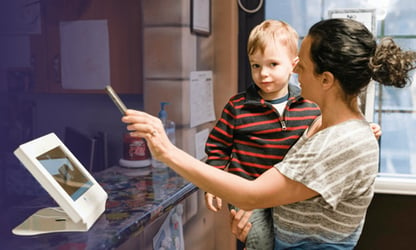
Forming social skills is an integral part of child development. Social skills help children interact with the world around them through relationship development, verbal communication, and body language.
The right set of social skills will make it easier for a child to make friends, share with their classmates, and cooperate in social environments. Well-developed social skills also lead to improved cognitive abilities and better mental health.
There are many ways to encourage a child's social skill development. It is important to teach these skills early in life, as these will be the building blocks for social interactions and success in adulthood.
Keep reading to learn why social skills are important for child development and how to teach these skills.
Why Are Social Skills Important?
When it comes to childhood development, there are certain milestones that dictate growth and advancement. Social skills development is valuable to many areas of a child's life.
Studies show that a lack of social skills can lead to poor outcomes in child development. It can hinder their ability to create relationships, affect their adjustment at school, lead to loneliness, and cause behavioral problems in the future. This is why it is important to instill social skills in children early on in life.
There are several different social skills that are indicative of child development. These include sharing, cooperating, following directions, using eye contact, use of manners, and understanding personal space. These are useful skills that will allow children to be successful in the social world.
Children with higher social development can form stronger friendships and are more likely to succeed in their education. Research shows that children with better social competence also benefit in the following areas:
- Twice as likely to attend post-secondary education
- More likely to earn a high school diploma
- Less likely to use illegal substances
- Less likely to get into trouble with the law
These are just a few of the ways that a child can benefit from social competence. There are special programs to help enhance social skills and build a strong foundation for success in the future.
Social Skills in Early Child Development
At different stages of development, children exhibit different social cues. For each age, there are different child development skills that most children can display. While development can vary depending on one individual child, there are certain milestones that are characteristic of each age.
Age Two to Three
At this age, children like to copy others, particularly older children and adults. They enjoy interacting with other kids and get excited when they meet other children. They also display behavior that goes against what they are told to do.
While the terrible twos can ignite some naughty behavior, closer to the age of three, children become a bit more independent. They can show a range of emotions, including empathy and affection for a friend.
At this age, they can also express frustration with changes in their daily routine.
Age Three to Four
Around ages three to four, children enjoy doing new things. They become more creative with their play and like to role-play as mom and dad. However, they cannot understand the idea of make-believe.
A child at this age can cooperate with other kids. They can also talk about the things they like and don't like.
Age Four to Five
Children age four to five want to appease their friends and begin to copy their friends. They are more likely to follow the rules and show more independence. They can also become demanding in certain situations.
They are also aware of their gender at this age, and they like to sing and dance. They now understand the concept of make-believe.
Age Five to Six
Child development skills from age five to six include being about to follow daily routines, take turns, and understand directions.
Kids at this age can understand the idea of humor and they can also explain the cause and effect of their feelings. They are also cognizant of their behavior if it might disrupt others in a certain setting. They can speak clearly in most conversations and others can understand what they are saying.
How to Encourage Children to Develop Social Skills
There are many ways that parents, caregivers, and educators can aid in child development skills. It is important for the adults in a child's life to be consistent in their teaching, so the child gets a clear understanding of what is expected in a social environment.
Being a Good Role Model
Modeling behavior is one of the most effective ways that you can teach your child social skills. During social interaction, use your manners by saying "please" and "thank you." Address others in a polite manner so that your child can see and copy your behavior.
Be sure to remind the child if they don't use polite language to reinforce good behavior.
Additionally, talk to the child about the importance of things like teamwork and cooperation. As you do something, talk to your child about why it's important. If everyone cleans up the toys, it's much easier, or helping a friend can make them happy.
Role-Play With Your Children
Another effective way to encourage the development of social skills is by role-playing. Create opportunities where you can put those skills into practice.
You can role-play being at a restaurant and how to ask for something they'd like. You can use arms-length distance to teach a child about personal space and keeping their hands to themselves.
If you read a story, ask the child what they remember to ensure that they are developing listening skills. Practice eye contact when telling a story. You can talk about how they felt after you've gone through the scenario to make sure they understand why it's important.
Offer Praise and Positive Reinforcement
Positive reinforcement is a great way to keep a child encouraged to utilize social skills. Be direct when giving praise by saying phrases like "Thank you for putting away your toys as I asked." These are clear and direct words of reinforcement that show they are following the rules.
If a child has difficulty following directions, reinforce their listening and operating skills. You can do this by asking your child to do something and giving them immediate praise for having listened and followed the directions.
Keep practicing this until they become more cooperative.
Learning Through Playing
Children learn through listening to others, mimicking behavior, and language. But they also enjoy learning through play. There are a variety of ways that you can incorporate social skills learning through play.
A kindergarten or daycare setting is a great place for children to interact with other children and put some of their social skills to practice. Here they will face challenges where they need to solve problems, share, resolve conflict, take leadership, and show empathy to others.
There are many ways that a child can grow and learn in this setting. It is especially helpful because it is outside of the home setting, allowing a child to interact with those outside of their immediate family. This puts them in a challenging new environment to utilize their skills and absorb skills from other kids.
Special programs can help fine-tune a child's social development in the right environment with support and encouragement.
Teaching Emotion Regulation and Understanding
An effective way to teach social skills is to help a child understand the role of emotions. This means helping them understand their own emotions as well as those of others.
You can use flashcards with faces that display a certain emotion. You can also ask the child to show you a face that represents a certain emotion.
Talk to the child to ask them to explain what the emotion means and how you can soothe it. For some children, emotion regulation can be difficult, and they will need guidance when they are having intense feelings.
Additionally, being able to understand others' emotions will teach the child important social skills such as empathy.
Encouraging Social Skills for Child Development
While there are many skills that are important for your child to learn, social skills are vital for child development. When teaching a child social skill, remember to model the behavior, teach emotion regulation, offer positive reinforcement, role play, and learn through play.
With each age comes a different set of social skills to foster child development and help build a successful future for every child.
Discover the Secrets for Simpler Afterschool Program Management!
Download our free eBook with expert tips that will not only help you improve your afterschool program, but show you how to simplify its management, so you and your team can enjoy a much needed breather.












